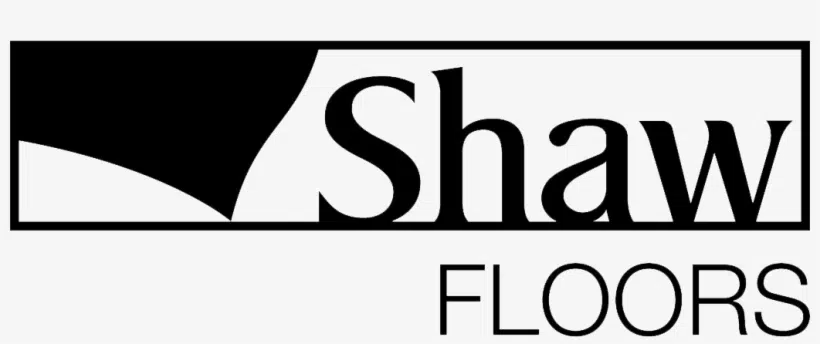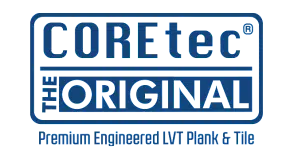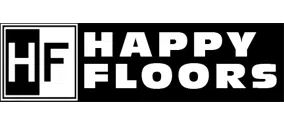LVP Vs Laminate: Which One Works Better in Humid Georgia Homes?
If you’re looking for flooring in humid Georgia, Luxury Vinyl Plank (LVP) usually outperforms laminate. LVP’s superior water resistance helps prevent warping, making it a durable choice for high humidity. While laminate is budget-friendly, it may swell and buckle over time in moist conditions. LVP additionally offers easy maintenance and a variety of styles. Considering long-term investment and lifestyle will help you decide, and there’s more to investigate on this topic.
Key Takeaways
- LVP offers superior water resistance, making it less likely to warp or buckle in humid Georgia climates compared to laminate flooring.
- Laminate can swell and develop gaps with excess moisture, potentially reducing its lifespan in high humidity environments.
- LVP’s durability and low maintenance make it a cost-effective long-term investment for humid homes, despite higher initial costs.
- Both flooring options require proper installation techniques, such as using a floating method, to minimize humidity-related issues.
- Choosing LVP may enhance aesthetic appeal and home value with its wide variety of styles suitable for humid conditions.
Understanding Humidity and Its Impact on Flooring
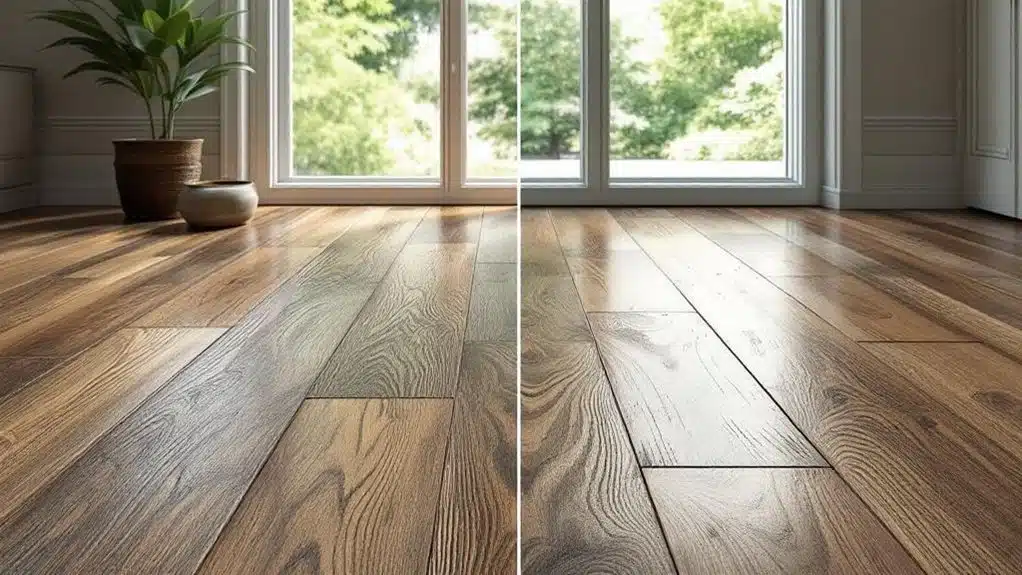
When you live in a humid environment, understanding how humidity affects flooring is vital for making the right choice for your home. High humidity levels can cause certain flooring materials to expand, warp, or even mold. For instance, natural wood can absorb moisture, leading to unsightly gaps and buckling. On the other hand, materials like luxury vinyl plank and laminate are designed to resist moisture, making them more suitable for humid conditions. Nevertheless, you’ll want to check the specific ratings and features of these materials, as not all are created equal. By considering how humidity interacts with various flooring options, you’ll guarantee a durable and aesthetically pleasing choice that serves both your needs and your home’s environment. Additionally, choosing water-resistant flooring can significantly enhance your home’s durability against moisture-related issues.
What Is Luxury Vinyl Plank (LVP)?
Luxury Vinyl Plank (LVP) is a high-quality flooring option made from multiple layers of vinyl, designed to mimic the look of natural wood or stone. Its structure typically includes a wear layer for durability, a design layer for aesthetics, and a backing for comfort and moisture resistance. With benefits like water resistance and easy maintenance, LVP is an excellent choice for humid homes. Additionally, its affordability without compromising style makes it a popular choice among homeowners looking to enhance their spaces.
Composition and Structure
Understanding the composition and structure of Luxury Vinyl Plank (LVP) can help you make an informed choice for your humid home. LVP is designed with specific material properties that improve its durability and moisture resistance. Its layered structure features:
- Wear Layer: Protects against scratches and stains.
- Core Layer: Provides stability and waterproof capabilities.
- Backing Layer: Offers comfort and sound absorption.
These structural differences distinguish LVP from other flooring options, making it a practical choice for humid climates like Georgia. Each layer works synergistically to guarantee LVP remains resilient against moisture, preventing warping or mold growth. Furthermore, LVP is scratchproof, scuff-resistant, and waterproof, which enhances its suitability for busy households. By considering these aspects, you can choose a flooring solution that serves both your needs and those of your home.
Benefits of LVP
If you’re looking for a flooring option that combines style and practicality, Luxury Vinyl Plank (LVP) should be at the top of your list. LVP features a durable construction that withstands moisture, making it ideal for humid Georgia homes. You’ll appreciate its wide range of LVP styles, from rustic woods to sleek stones, allowing you to match any décor.
Here’s a quick comparison of some LVP benefits:
| Feature | Benefit | Impact on Homeowners |
|---|---|---|
| Water-resistant | Prevents warping and damage | Peace of mind in humid climates |
| Easy installation | Saves time and labor costs | Quick home updates |
| Variety of styles | Complements any design aesthetic | Improves home value |
| Low maintenance | Simple cleaning routines | More time for family and friends |
| Comfort | Soft underfoot | Creates a welcoming environment |
Advantages of LVP in Humid Climates
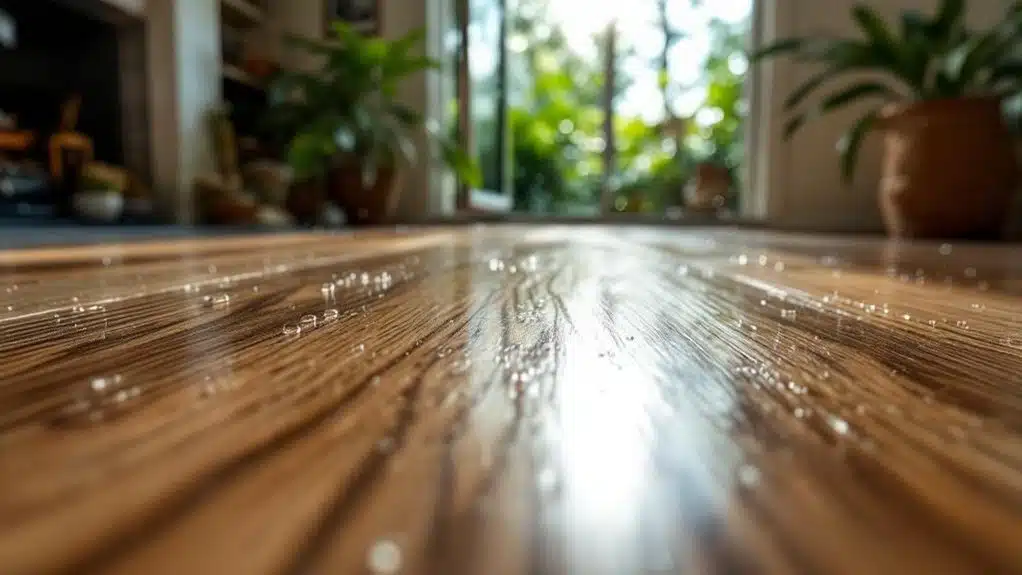
When you’re choosing flooring for humid climates, LVP offers outstanding water resistance that sets it apart from laminate. Its ability to withstand moisture not only prevents warping but additionally guarantees long-lasting durability. With LVP, you can enjoy beautiful floors without worrying about the effects of humidity on your investment.
Water Resistance Benefits
While both LVP (Luxury Vinyl Plank) and laminate flooring have their merits, LVP stands out considerably in humid climates due to its superior water resistance. This feature not only protects your flooring from moisture-related damage but additionally improves flooring longevity, ensuring it remains beautiful for years.
- Impervious to spills: You can clean up messes without worrying about warping or staining.
- Prevents mold growth: The water-resistant properties help keep your home healthier by reducing humidity-related issues.
- Ideal for all rooms: Whether it’s your kitchen, bathroom, or basement, LVP adapts seamlessly without compromising its quality.
Choosing LVP is a practical decision for maintaining a comfortable and durable home in Georgia’s humid environment.
Durability in Moisture
Although many flooring options struggle in humid environments, LVP excels in durability, making it a smart choice for homeowners facing moisture challenges. Its superior moisture resistance guarantees that it won’t warp, swell, or buckle, even in Georgia’s sticky climate. This means you can enjoy peace of mind knowing your investment will last longer. LVP’s durability contributes to flooring longevity, allowing it to withstand the wear and tear of everyday life, from kids and pets to heavy foot traffic. Plus, with various styles available, you can achieve both functionality and aesthetics. By choosing LVP, you’re not just enhancing your home; you’re likewise providing a resilient, long-lasting flooring solution that meets the demands of humid environments.
Disadvantages of LVP in Humid Climates
Although luxury vinyl plank (LVP) flooring is often praised for its water resistance, it’s not without drawbacks in humid climates. You might encounter several LVP disadvantages that can affect your home’s comfort and longevity.
- Expansion and Contraction: High humidity can cause LVP to expand and contract, leading to gaps or buckling.
- Mold Growth: If moisture gets trapped underneath, it can create an ideal environment for mold, posing health risks.
- Limited Lifespan: Constant exposure to humidity effects may shorten the lifespan of LVP compared to other flooring options.
Understanding these factors can help you make an informed choice for your home in Georgia’s humid environment. Consider these potential issues to guarantee a more satisfying flooring experience.
What Is Laminate Flooring?
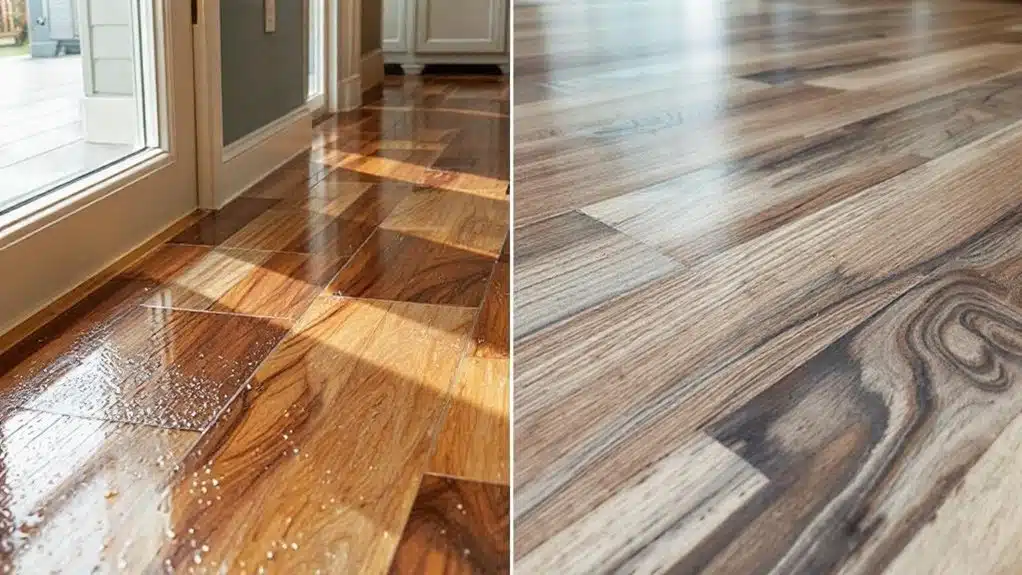
Laminate flooring is a multi-layered product designed to mimic the look of real wood or stone while being more budget-friendly. It typically consists of a core layer made from high-density fiberboard, topped with a printed design layer and a protective wear layer. Understanding its composition, installation process, and maintenance tips can help you decide if it’s the right choice for your humid home.
Composition and Structure
When considering flooring options, understanding the composition and structure of laminate flooring is crucial. This type of flooring is engineered with several layers that contribute to its durability and appeal. The material differences set it apart from other flooring options, making it a popular choice for many homeowners.
- Wear Layer: Protects against scratches and stains.
- Design Layer: Offers a realistic appearance, mimicking wood or stone.
- Core Layer: Provides structural resilience, ensuring stability and strength.
These layers work together to create a robust flooring solution that can withstand daily wear and tear. By knowing how laminate flooring is composed, you can make a more knowledgeable choice for your home, especially in humid Georgia conditions.
Installation Process Overview
Understanding the installation process for laminate flooring can help you make educated choices about your home renovation. First, you’ll need to gather vital flooring tools like a measuring tape, saw, and spacers. Begin by preparing the subfloor, making sure it’s clean and level. Next, choose suitable installation techniques, such as the floating method, which allows the planks to expand and contract without being glued down. This is ideal for humid environments like Georgia. Carefully lay the first row, using spacers to maintain an expansion gap. Continue installing row by row, making sure tight seams and proper alignment. Once finished, remove spacers, and trim any excess underlayment at the edges. Following these steps will guarantee a successful and efficient laminate flooring installation.
Maintenance and Care Tips
After successfully installing laminate flooring, maintaining its appearance and durability is key to enjoying your investment for years to come. To keep your floors looking their best, use effective cleaning techniques and consider applying protective coatings. Here are some practical tips to help you:
- Regularly sweep or vacuum to remove dirt and debris, preventing scratches.
- Damp mop with a mild cleaner specifically designed for laminate; avoid excessive water.
- Apply protective coatings periodically to improve durability and shine, especially in high-traffic areas.
Advantages of Laminate in Humid Climates
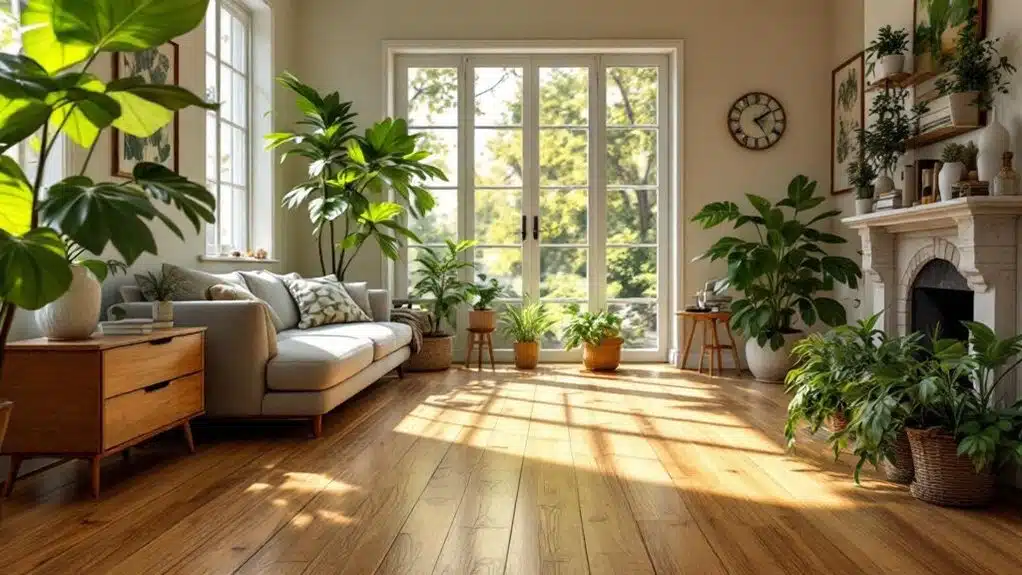
Although you might worry about flooring options in humid climates, laminate offers several advantages that make it a practical choice. One of the key benefits is its moisture resistance, which helps protect against mold and mildew, common concerns in humid areas like Georgia. In addition, laminate provides impressive laminate longevity, ensuring your investment endures over time, despite challenging conditions. Unlike traditional hardwood, laminate can withstand fluctuations in humidity without warping or buckling. It’s also easy to clean, requiring only regular sweeping and occasional mopping, which is perfect for busy households. With a wide range of styles and finishes, you can achieve the look you want while enjoying the durability and resilience laminate offers in humid environments.
Disadvantages of Laminate in Humid Climates
While laminate flooring may seem like a viable option for humid climates, it does come with notable disadvantages that you should consider. In areas like Georgia, the high humidity can lead to significant issues with laminate flooring.
- Laminate swelling: Excess moisture can cause the planks to expand, leading to gaps and an uneven surface.
- Moisture damage: Prolonged exposure to humidity can compromise the integrity of the laminate, resulting in warping and a shorter lifespan.
- Limited repair options: Once damaged, laminate flooring typically can’t be refinished, which means you’ll likely have to replace entire sections.
If you’re committed to maintaining a beautiful and functional home, these factors make laminate a less ideal choice in humid conditions.
Comparing Durability and Maintenance

When considering flooring options for humid homes, it’s crucial to compare the durability and maintenance needs of LVP (Luxury Vinyl Plank) and laminate. With regard to durability comparison, LVP stands out as it’s waterproof, resisting moisture damage better than laminate, which can warp in high humidity. This makes LVP a smart choice for areas prone to moisture.
In relation to maintenance requirements, both options are relatively easy to care for, but LVP typically requires less upkeep. You can simply sweep or mop it, while laminate needs careful cleaning to avoid water exposure. If you want a long-lasting, low-maintenance solution for your humid Georgia home, LVP is likely the better option, prioritizing both durability and ease of maintenance.
Cost Considerations: LVP vs. Laminate
As you weigh your flooring options for a humid environment, it’s important to contemplate the cost differences between LVP and laminate. Here’s a quick cost comparison to help with your budget considerations:
- LVP typically ranges from $2 to $7 per square foot, making it a higher upfront investment.
- Laminate is usually more affordable, costing between $1 to $5 per square foot.
- Installation costs can likewise vary, with LVP often requiring professional help owing to its intricate locking system.
While LVP may cost more initially, its durability and moisture resistance can save you money in the long run. Consider how these costs fit into your overall budget and long-term plans for your home.
Making the Right Choice for Your Home
Choosing the right flooring for your home isn’t just about aesthetics; it’s likewise vital to contemplate how the material will perform in a humid environment. In Georgia’s moisture-rich climate, opting for flooring styles with high moisture resistance is significant. Luxury Vinyl Plank (LVP) excels here, as it withstands humidity better than laminate, which can warp or buckle over time. While laminate may offer a lower price point, it lacks the durability needed in damp conditions. Think about your lifestyle and how often you entertain or have pets; LVP’s resilience makes it ideal for active households. Ultimately, consider both practical performance and style, ensuring you select a flooring option that meets your needs while enhancing your home’s beauty.
Conclusion
In the battle between LVP and laminate for your humid Georgia home, the stakes are high. While LVP offers resilience against moisture, laminate can falter under pressure. You’ve learned the pros and cons of each, but the final decision rests with you. Will you play it safe with LVP’s durability, or take a chance on laminate’s affordability? As you weigh your options, remember: the right choice not only protects your investment but additionally improves your living space. What will you choose?

